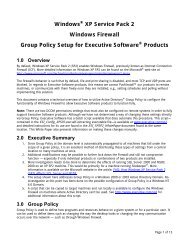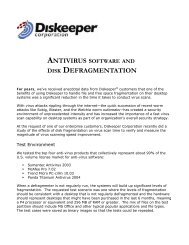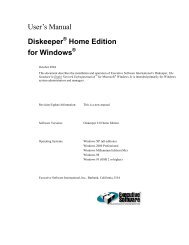Diskeeper 10 User's Manual
Diskeeper 10 User's Manual
Diskeeper 10 User's Manual
Create successful ePaper yourself
Turn your PDF publications into a flip-book with our unique Google optimized e-Paper software.
72 <strong>Diskeeper</strong> and Group Policy<br />
Running at the lowest priority minimizes the system performance impact when <strong>Diskeeper</strong> is defragmenting a<br />
disk volume. However, defragmentation jobs running at the lowest priority can take substantially longer to<br />
complete than those running at higher priorities, since <strong>Diskeeper</strong> “backs off’ for any process running at a higher<br />
priority (even screen savers).<br />
Defragmentation Method<br />
These settings determine the type of defragmentation to perform for each of these defragmentation job types:<br />
• Primary Defragmentation Jobs<br />
• Secondary Defragmentation Jobs<br />
• <strong>Manual</strong> Defragmentation Jobs<br />
When this policy is enabled, the method defined here will apply to all computers. When this policy is either<br />
disabled or not configured, the defragmentation method established locally will be followed. These<br />
defragmentation methods are available:<br />
Quick Defragmentation — This method provides the fastest defragmentation. It reduces the defragmentation<br />
time by placing the emphasis on defragmenting the fragmented files, rather than free space consolidation, since<br />
this returns the greatest system performance gain. This defragmentation method will complete faster and use<br />
fewer resources, but note that the free space consolidation will not be as thorough as the other methods.<br />
Recommended Defragmentation — This is the default, proven and balanced mix of file defragmentation and<br />
free space consolidation. It is designed to gain the best disk performance without using excessive system<br />
resources.<br />
Comprehensive Defragmentation — This defragmentation method performs additional free space<br />
consolidation. This method performs a normal <strong>Diskeeper</strong> defragmentation, but then additionally performs extra<br />
processing to further improve free space consolidation. It is important to note this method requires additional<br />
processing and time, and free space consolidation improvement will be gradual as the option is used over time.<br />
Since the Comprehensive Defragmentation method is best suited for scheduled defragmentation jobs, it is not<br />
available for <strong>Manual</strong> Defragmentation Jobs.<br />
In addition to each of these defragmentation methods, you can alternately enable and disable the Efficiently<br />
defragment large files option for each job type.<br />
Power Management<br />
This option is intended primarily for laptop and portable computers.<br />
When this option is enabled and the computer is running on battery power, any scheduled defragmentation jobs<br />
are postponed, and a message noting this is written to the Windows Application Event Log. If a<br />
defragmentation job is started manually when this option is enabled (and the computer is running on battery<br />
power), a message is displayed asking if you want to continue, even though running <strong>Diskeeper</strong> on battery<br />
power may reduce the available battery time.<br />
When this option is enabled and the computer switches from normal power to battery power, any ongoing<br />
scheduled analysis or defragmentation jobs are safely stopped and a message noting this is written to the<br />
Windows Application Event Log. If <strong>Diskeeper</strong> is running manually and the computer switches to battery power<br />
when this option is enabled, a message is displayed informing you that <strong>Diskeeper</strong> has stopped running.<br />
When this policy is enabled, the Power Management feature will be turned on for all computers. When this<br />
policy is not configured, the setting established locally will be followed.<br />
When this policy is disabled, the Power Management feature will be turned off for all computers.<br />
System Tray Defragmentation Delay<br />
This policy allows non-administrative users to use the <strong>Diskeeper</strong> icon in the system status area (also known as<br />
the system tray) to postpone defragmentation operations.






